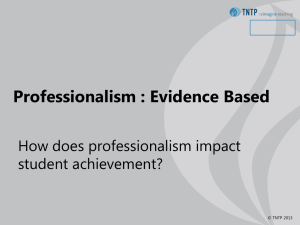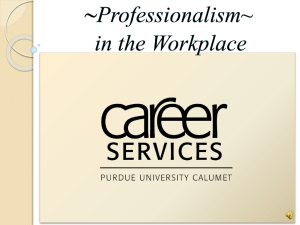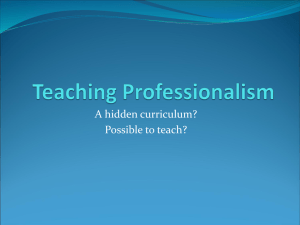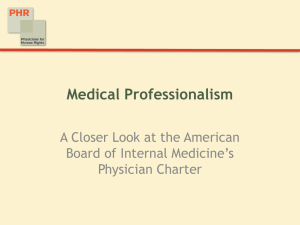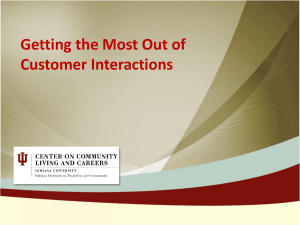Read more - School of Medicine
advertisement
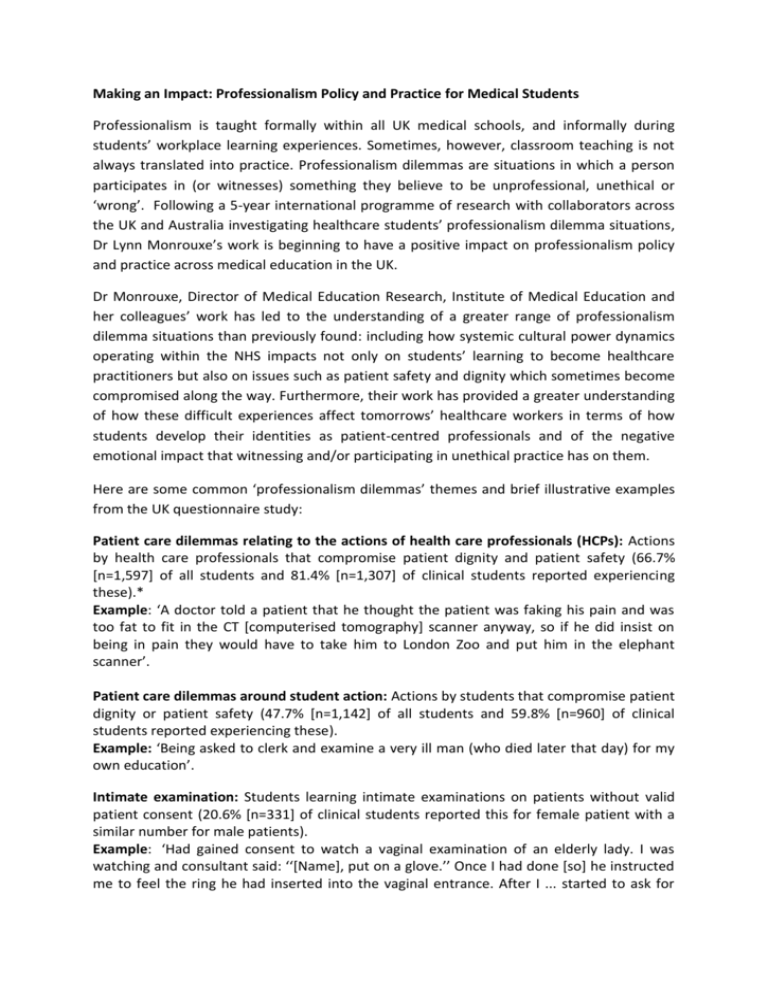
Making an Impact: Professionalism Policy and Practice for Medical Students Professionalism is taught formally within all UK medical schools, and informally during students’ workplace learning experiences. Sometimes, however, classroom teaching is not always translated into practice. Professionalism dilemmas are situations in which a person participates in (or witnesses) something they believe to be unprofessional, unethical or ‘wrong’. Following a 5-year international programme of research with collaborators across the UK and Australia investigating healthcare students’ professionalism dilemma situations, Dr Lynn Monrouxe’s work is beginning to have a positive impact on professionalism policy and practice across medical education in the UK. Dr Monrouxe, Director of Medical Education Research, Institute of Medical Education and her colleagues’ work has led to the understanding of a greater range of professionalism dilemma situations than previously found: including how systemic cultural power dynamics operating within the NHS impacts not only on students’ learning to become healthcare practitioners but also on issues such as patient safety and dignity which sometimes become compromised along the way. Furthermore, their work has provided a greater understanding of how these difficult experiences affect tomorrows’ healthcare workers in terms of how students develop their identities as patient-centred professionals and of the negative emotional impact that witnessing and/or participating in unethical practice has on them. Here are some common ‘professionalism dilemmas’ themes and brief illustrative examples from the UK questionnaire study: Patient care dilemmas relating to the actions of health care professionals (HCPs): Actions by health care professionals that compromise patient dignity and patient safety (66.7% [n=1,597] of all students and 81.4% [n=1,307] of clinical students reported experiencing these).* Example: ‘A doctor told a patient that he thought the patient was faking his pain and was too fat to fit in the CT [computerised tomography] scanner anyway, so if he did insist on being in pain they would have to take him to London Zoo and put him in the elephant scanner’. Patient care dilemmas around student action: Actions by students that compromise patient dignity or patient safety (47.7% [n=1,142] of all students and 59.8% [n=960] of clinical students reported experiencing these). Example: ‘Being asked to clerk and examine a very ill man (who died later that day) for my own education’. Intimate examination: Students learning intimate examinations on patients without valid patient consent (20.6% [n=331] of clinical students reported this for female patient with a similar number for male patients). Example: ‘Had gained consent to watch a vaginal examination of an elderly lady. I was watching and consultant said: ‘‘[Name], put on a glove.’’ Once I had done [so] he instructed me to feel the ring he had inserted into the vaginal entrance. After I ... started to ask for consent, he cut me off saying, ‘‘You don’t mind if he feels do you, he’s just a doctor in training and needs to know how it feels.’’ Was very much a statement rather than [a] question’’. *Monrouxe et al. (under revision) Professionalism dilemmas in UK medical students’ workplace learning environments: A questionnaire exploring the influence of gender and frequency on moral distress. Acad Med; Rees et al. (in press) Narrative, emotion and action: Analysing medical students’ written stories of ‘most memorable’ professionalism dilemmas. Med Educ. As a result of this work, medical schools across the UK are now beginning to change (or better enforce) ethical guidelines around students’ interactions with patients. For example, Newcastle School of Medicine undertook independent work of their own year four and five students and confirmed the scale of the problem at their school. Following this they reviewed their regional consent policy, fed back their findings to Directors of Medical Education and their Regional Senior Medical Advisory Group for further changes to be made. Peninsula Medical School also made policy changes and have taken steps to implement them. “The new undergraduate curriculum in Cardiff will have professionalism as a clear vertical theme throughout the five years,” said Professor Paul Kinnersley, Director of Teaching and C21 Lead for Professionalism, Ethics and Personal Development, Institute of Medical Education. “The lessons from Lynn Monrouxe's research will be at the foundation of teaching, and students will have regular opportunities to share and discuss the dilemmas they have come across,” he added. “This will support students to re-commit to the professionalism values taught during formal learning. ” Dr Monrouxe and her colleagues (notably Professor Charlotte Rees, University of Dundee, Dr Ming-Jung Ho, National Taiwan University College of Medicine and Dr Madawa Chandratilake, University of Kelaniya) have now begun to develop a similar programme of work within a Chinese cultural setting and a South-east Asian cultural setting to facilitate organizational cultural change internationally and to enhance a cultural awareness of the differences in professionalism for medical trainees, educators, and providers who frequently travel across cultural borders at home and abroad. Picture by Jasmine Monrouxe Photography
